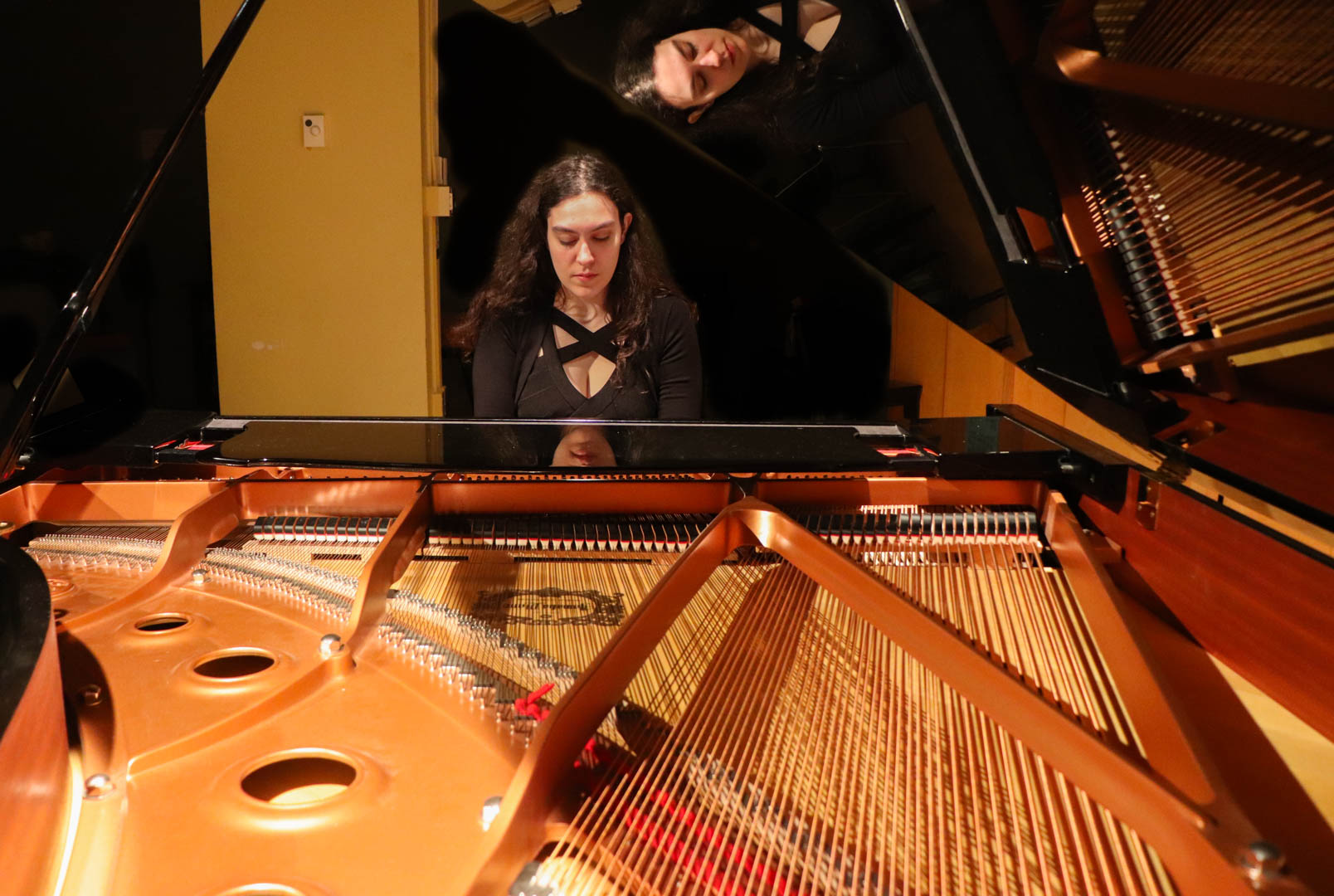Victoria Slamovits’ path reflects the synthesis of an education in the liberal arts and music. The two have gone hand-in-hand—she can’t have one without the other.
“I graduated high school in 2019, and I wanted to go straight into music at Dal,” she explains. “But I wasn’t quite at the level of being considered to audition. So, my previous piano teacher suggested that I do the Foundation Year Program [FYP] because she, like a lot of people in my life, knows that I like literature and philosophy and history, things like that.”

So, Slamovits started her undergraduate career with a rigorous year in FYP, finding particular interest in the Romantic texts from the 19th century, all the while preparing her audition. At the end of her first year, she was accepted into the Fountain School of Performing Arts. In her third year, she chose the Performance concentration, all according to plan.
Slamovits describes herself as a person who likes to have a plan—if she decides on something, she tends to stick to it and see it through.
Slamovits has been playing the piano since age five. She gravitates toward classical music, though lately she’s been branching out into different styles. In addition to the piano, she also has 14 years of violin and 12 years of viola experience under her belt, which she hones with the Dal Orchestra. Two years ago, she performed the first movement of Beethoven’s third piano concerto in C minor as a solo piece in the Fountain School’s coveted Concerto Night.
Music, Slamovits says, has long been an integral part of her life, an extension of her emotions, a way to comfortably express herself when words fail. When she needed to relax or manage stress, she addressed those feelings through music.
As she progressed further into her degree, that began to shift.
“I got overwhelmed and burned out,” she says. “Basically, if you’re doing a concentration in performance, your third-year recital is 30 or 40 minutes of you playing piano, and then your fourth-year recital would be an hour or 70 minutes. It’s a lot of really long pieces of music, and you have to have the stamina. Some people can do it, and some people maybe don’t feel as comfortable. I thought that I wanted to do it last year, but in [preparing for] a 30-minute recital, I kind of burnt out.”
Realizing this, Slamovits reflected on the courses she’d taken and what it was she had enjoyed most in her degree to date. She found herself thinking about two courses in particular: Introduction to Composition, and Counterpoints. The latter focused on the musical technique “counterpoints” and how it was utilized by composers in the 17th and 18th centuries.
“I was always interested in composing. I had a little notebook, and I would always compose my own little ideas, but I never really stuck to one thing,” she says. “I would start something and then leave it, or I would have one idea and wouldn’t know how to keep going with it. So I wanted to take classes to figure out how to take it to the next level.”
It was again a piano teacher who helped Slamovits make her decision. Associate Professor Peter Allen observed how Slamovits’ enthusiasm went beyond performance, embracing music’s deeper context, including historical information about composers and the pieces she studied. Changing her concentration from Performance to General Music allowed her the flexibility to pursue these interests further.
As Slamovits describes this shift, it’s clear she found her niche—and learned a valuable lesson, too.
“Things aren’t as black and white as you might think … I think sometimes I have an idea that everything has to be either yes or no, or this or that. And so what I’ve learned over the years is that I can actually change things around a little bit.”

On Friday, April 19, Slamovits delivered the final recital of her undergraduate degree, the culmination of everything she’d learned over the past four years. For those in the General Music concentration, this performance is called a Graduation Project. In addition to playing pieces, Slamovits also got to make a presentation about the songs and composers she performed.
Excitingly, she debuted an original composition entitled “Human Nature,” performed by a string quartet and inspired by Mary Shelley’s Frankenstein—a favourite of Slamovits’ from her time in FYP.
“I actually kind of liked the idea of composing something based on literature, something I learned in FYP. One of the themes in that piece is kind of a sad, melancholy melody, and I was imagining the Creature and his loneliness when I wrote it.”
Slamovits is keeping her options open after graduation. She’s considering a Master’s in Musicology, which would allow her to continue to build on her interests of music and history.
“It’s more like the academic side of music, instead of just performing or composing. You can write essays and do research,” she says.
“I like history and researching, and I’ve been told by a lot of professors and people in my life that I seem very academic, so I think I’d like a career in research and music.”

